Putting order into a vivifying growth, though chaotic and without a direction. The Ambasciatori del Gusto’s commitment in the valorisation of Italian cuisine in Italy and abroad was shown last week, in Rome, at Palazzo delle Esposizioni. The home to Open Colonna (born right here on the 2nd of October 2007, «we’ve turned 10», pointed out Antonello Colonna. Happy birthday) was the location of the association’s first congress. The title: “Italia-Mondo, Andata e ritorno”, a rather all-embracing theme including the many facets of the issues Italian fine dining must face these days. They discussed about taxes, training, the value of made in Italy and of the challenge that Italian food will have to face in 2018. So a bit about everything.
Some very fertile elements came out: «These issues, in order to move from design to “reality”, need the support of all the
Ambasciatori del Gusto. We must work together to develop the Italian system and become a permanent aggregation pole for all our future activities», said president
Cristina Bowerman when opening the congress works.
Here is a (very personal) selection of the most interesting things said.
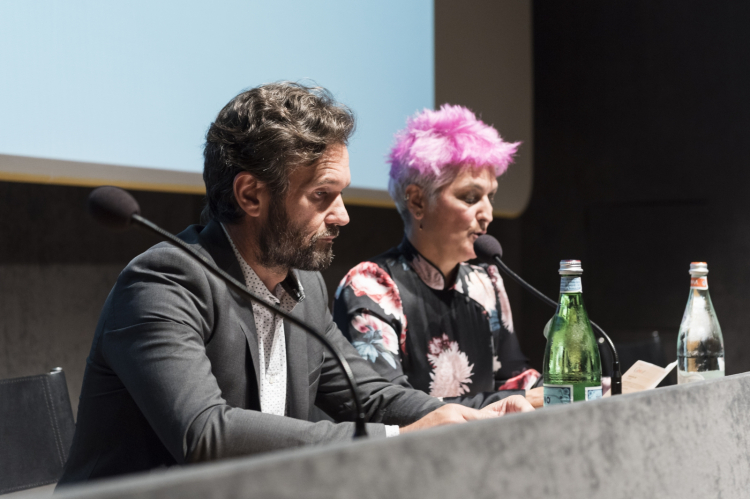
Carlo Cracco and Cristina Bowerman
–
Carlo Cracco: «It’s been a year since we created
Ambasciatori del Gusto; we’ve done many things, many more are in progress, because they require more time. These include our commitment in improving training in Catering Schools. We have studied an innovative format which we’ll apply in Amatrice [at the Centro di Formazione professionale di Amatrice, now moved to Rieti because the 2016 earthquake destroyed the building.
Ambasciatori del Gusto adopted it]. We want to create something that still doesn’t exist».
THE IDEA FOR AMATRICE (AND BEYOND) – So what’s the idea? Completing the training of students who are about to embrace the job market; make sure the best chefs build a relationship with schools, «so that students know what expects them later» (
Carlo Cracco). In Amatrice/Rieti, for instance, they’ve already planned the direct involvement of
Cracco,
Renato Bosco, brothers
Serva,
Marco Stabile, and as for the dining room,
Mariella Caputo and
Marco Reitano. It will be the “pilot episode” of a format «we want to share with the Ministry for Public Education» (
Cracco).
BUSINESS IS BUSINESS – An old problem for the Italian restaurant industry: size (and entrepreneurship).
Severino Salvemini, professor at Bocconi discussed this: «The industry’s situation has improved greatly over the past few years. Today there’s greater capacity of working as a system, greater media relevance, a strong public attention». However, problems remain «that are typical of other sectors such as fashion, design, art: that is to say putting together the creative and administrative aspects», good ideas and turnover at the end of the month, that is. «The “small is good” myth, the myth that development necessarily implies a McDonaldisation of the offer, a lower quality, remains, but has weakened». According to
Salvemini it is instead possible to «match fine crafts with “industrialization”. Even in the restaurant industry one should act as business and not as person, take care of fund raising and organization, think of who will come after us, because a business must live in time». The great Italian restaurants of the Seventies, instead, are almost all closed.
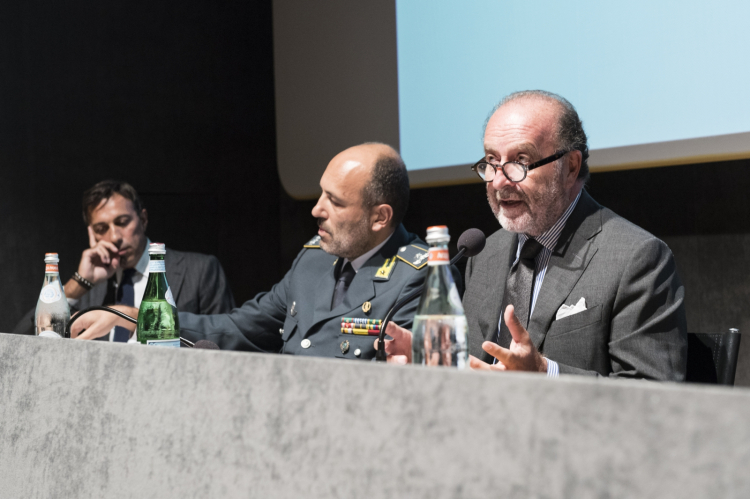
General Cosimo Di Gesù and professor Severino Salvemini
- There are issues too. «Attention is necessary – pointed out the provincial commander of the Guardia di Finanza di Roma, general
Cosimo Di Gesù – The index of criminal infiltration in restaurant businesses is very high: out of the 5.1% confiscated businesses in Lazio [twice as many compared to the national average], 30% are restaurants and hotels». This is no news, «we’ve noticed this since the Seventies», but it’s also changing appearance: today ‘ndrangheta has the greatest interests. The classic format is the creation of big restaurants in the historic centre, applying very competitive prices (these places are used for money laundering, so they need big numbers), even though there’s a trend to move to the higher end. Two features. The first, «we’ve never received reports of any suspicious activity by industry representatives. We ask the
Ambasciatori for their help». Second: «This especially in the South. Until people don’t find out an activity is run by the mafia, it’s very popular. As soon as it is confiscated and the State arrives, nobody goes there». The opposite should happen.
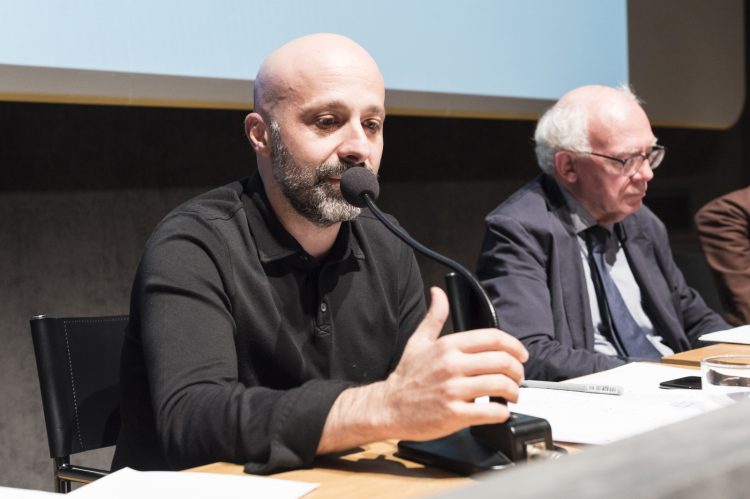
Niko Romito. To his left, Alberto Capatti
- «Good training of restaurant professions can be exported, even more than mozzarella», explained
Alberto Capatti, university professor and historian of Italian gastronomy. Yet today it looks like a mozzarella gone bad, because of the «fractures between different levels of teaching, and the job market» (
Capatti) and of the curriculum imposed by the ministry for catering schools «stuck in the Eighties», notes
Niko Romito, who adds: «Programmes are not sufficiently up to date nor are the teachers». The latter don’t have to take tests or assessment exams. Everything is still while the industry has changed a lot. Today nutrition and health are very important, but ignored in catering school. So pupils end up being more influenced by the Internet than by their teachers, and thus risk being subjected to styles imported from abroad. «How can it be – wonders
Romito – that 40% of the curriculum is based on basic preparations, using with butter, jus, which don’t represent Italian cuisine at all?».
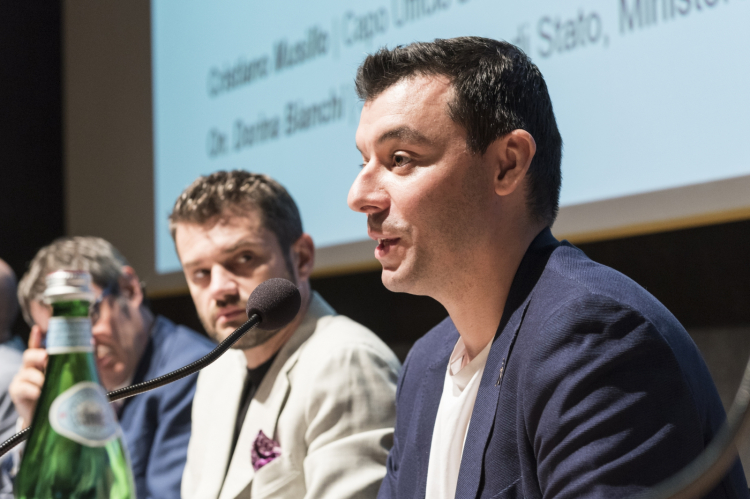
Enrico Bartolini and Luca Fantin
– What a model for the (great) Italian cuisine abroad.
Luca Fantin told his experience as an Italian chef working at
Bulgari in Tokyo. After importing Italian products for two years, he started to «build relationships with small producers and Japanese businesses making Italian cuisine ingredients thus creating a local micro-economy. «I now have 55 suppliers (for a restaurant seating 40 people), instead of the 3 or 4 a hotel restaurant like mine usually has: there’s the fisherman who brings live scampi, farmers bringing radicchio…». Sulphurous
Enrico Bartolini: «The story behind the dish is not attractive enough, when you open a restaurant abroad». You need a new format, large numbers, «restaurants abroad often seat over 100 people, so as to cover the costs of having the chef travel there», but there’s more than «including burrata with cherry tomatoes in the menu. The goal is to present what we already make in Italy: convincing dishes», perhaps not too complex.
SOS WAITER - The chef at
Mudec in Milan is originally from Tuscany, and you can tell. He doesn’t mince his words: «We ask too much of waiters, and give too little. We should have the tools to help them, financial and tax incentives. Instead, we often think it’s enough to offer them extra free time or a new uniform. In fact, they earn very little in Italy».
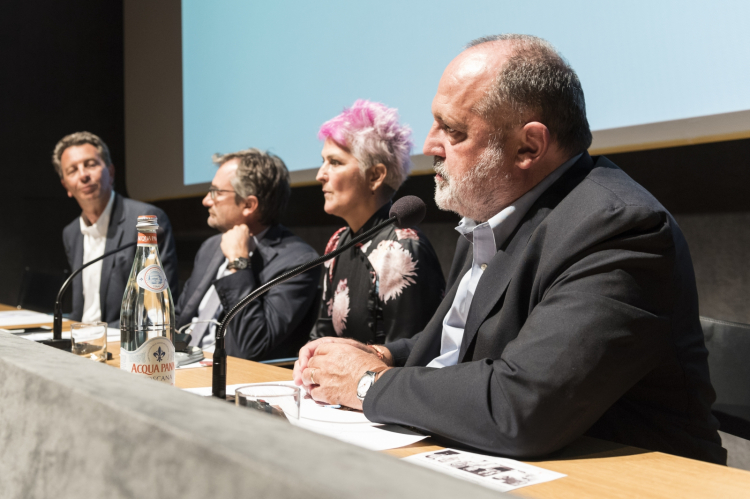
Cristina Bowerman and Paolo Marchi
– We must think big, says
Stefano Vaccari, chief of department at the Ispettorato centrale della tutela della qualità e repressione frodi dei prodotti agroalimentari: «Prosecco sells half a billion bottles, Grana Padano is the first PDO in the world, followed by Parmigiano Reggiano. We cannot think that bigger means less good: champagne sells 300 million bottles, lambrusco 60. Yet…».
Cristiano Musillo spoke instead of the next
Settimana italiana della cucina italiana nel mondo (20-26 November 2017). At the end of the panel
Dorina Bianchi, undersecretary at
Mibact, recalled that «made in Italy is the third most known brand after Coca Cola and Visa and the strength of tourism lies also in Italian food, which foreigners travelling here consider a parameter to assess of their holiday».
PASSIONATE CONSORTIUMS - «One of the weak points of the industry, is the distribution system» said
Luca Bianchi, chief of the Competitive Policies Department at
Mipaaf. It is necessary to pair the distribution process with the distribution of the knowledge of Italian cuisine; cooks are a means to allow the travelling of products mostly made by small and medium sized enterprises. The latter find it hard to deal with international distribution chains, given the unbalanced size difference and also because our producers often are not enough structured to face larger markets. This is why the consortium model succeeds, pointed out
Nicola Cesare Baldrighi, president at
Associazione italiana Consorzi Indicazioni Geografiche: «It is often difficult to explain, especially in countries used to private businesses like the US, that Grana Padano is not a company, but a brand representing hundreds of producers». This, however, is a key point so as to make sure that the pulverization of Italy’s production of excellent products doesn’t suffer from the insufficient business size. Finally
Bowerman: «As we’ve seen, it is not true that small is better. Neither with restaurants, nor in distribution».
Translated into English by Slawka G. Scarso